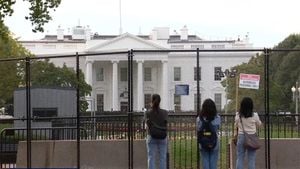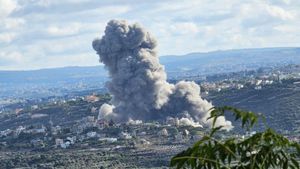Large airstrikes early Thursday morning struck the southern suburbs of Beirut, Lebanon, including one near the country’s sole international airport. The Israeli military had previously issued warnings, pointing to Hezbollah facilities at various locations. The intensity of these operations marks a significant development amid the broader conflict between Israel and Hezbollah.
This escalation follows Israel's announcement of the expansion of its ground operations in northern Gaza, particularly around Beit Lahiya, where Hamas militants are believed to be regrouping after sustained bombardments. The Israeli military maintains its focus on targeting Hamas, which has been involved in conflict with Israel since it launched attacks on October 7, 2023, resulting in violence across both Gaza and Lebanon.
Hezbollah's leader, Naim Kassem, stated during a recent address the group is open to ceasefire negotiations, but only after “the enemy stops its aggression.” His remarks coincided with the end of the 40-day mourning period following the assassination of Hassan Nasrallah, the group’s former leader, which had significant impact on the group's morale and strategy.
Since the conflict began, over 3,100 people have lost their lives and approximately 13,800 have sustained injuries across Lebanon, according to health ministry sources. The tragedy of the conflict has also seen civilian losses, including many women and children.
On October 7, Hamas militants executed deadly incursions, claiming around 1,200 Israeli lives and taking more than 250 captives. This initiated one of the fiercest military responses from Israel, resulting so far in over 43,000 casualties, predominantly women and children. These figures highlight the grim toll of the current violence.
Meanwhile, conversations concerning humanitarian situations remain urgent. The top U.N. humanitarian official for Gaza has recently convened discussions with Israeli Prime Minister Benjamin Netanyahu about facilitating unhindered humanitarian aid delivery to Palestinians. The U.N. is pushing for urgent measures to alleviate the dire circumstances faced by civilians caught up amid the fighting.
Israel has faced criticism for its alleged blockades of food and water supplies to northern Gaza, making it increasingly difficult for humanitarian workers to reach those affected. Reports indicate significant displacement among civilians, with around 14,000 people recorded as displaced and sheltering temporarily at various centers operated by the U.N. Relief and Works Agency for Palestine Refugees.
Despite the escalation of strikes, Israel maintains its position, asserting significant achievements against Hamas targets. An Israeli military spokesperson emphasized operations have been carefully conducted to avoid civilian casualties. Nonetheless, civilian infrastructure, including schools designated as shelters, has been hit amid these military operations, causing widespread panic and despair.
The humanitarian crisis has been pronounced. On Thursday, news emerged of another strike on a U.N. school shelter where civilians had sought refuge, leading to the deaths of at least 14 people. This incident intensifies calls for accountability and the need for international intervention to safeguard civilians caught up amid the conflict.
Following the airstrikes, thousands have been seen fleeing their homes, increasing the number of displaced individuals to over 1.2 million, significantly worsening the humanitarian crisis and living conditions across Lebanon and Gaza.
The tense situation has also led to repercussions for those involved with U.N. agencies, with Israeli authorities alleging some staff members had indirect ties with Hamas. This has prompted significant alterations to humanitarian operations, with Israeli Parliament recently passing legislation to ban operations by the U.N.'s Relief and Works Agency. The legality and practicality of restricting humanitarian aid activities raises significant concerns as the international community grapples with continuing hostilities.
On the ground, the situation remains dire, as aid groups continue to encounter difficulties stemming from the conflict. The Israeli military recently ordered evacuations of numerous neighborhoods west of Gaza City amid concerns of ground operations targeting areas believed to shelter Hamas militants.
Overall, the region faces relentless violence, civilian casualties continue to rise, and the necessity for both immediate and long-term resolutions grows increasingly pressing. The calls for peace stand juxtaposed against the backdrop of military strategies on both sides, reinforcing the complexity of the current geopolitical situation.



